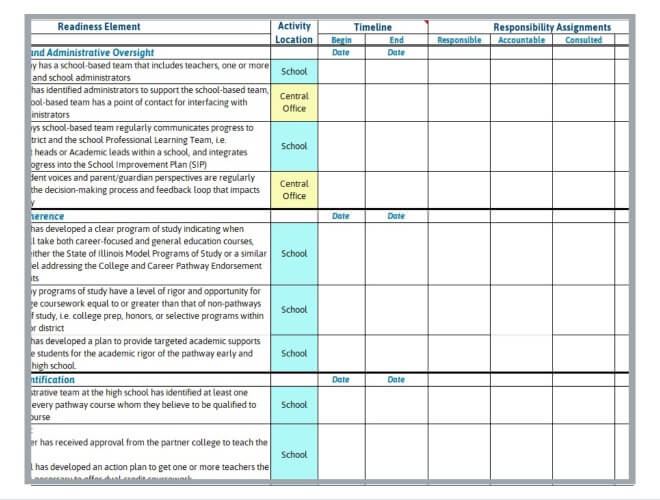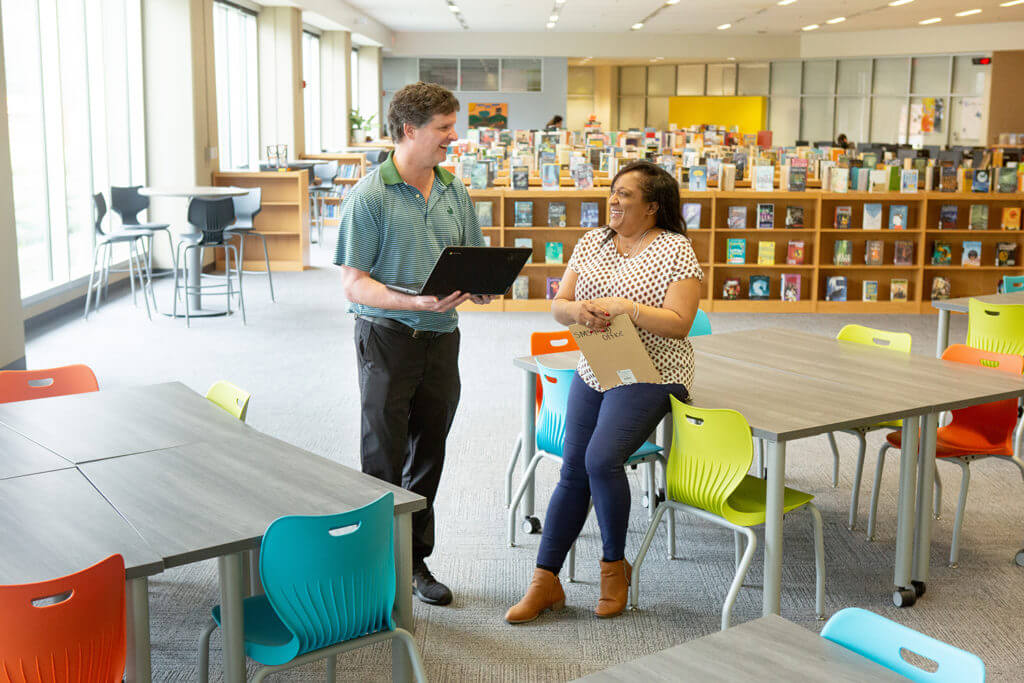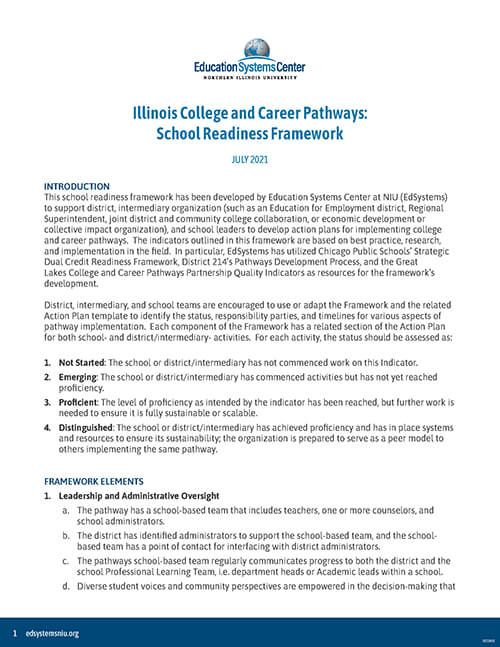Since our founding, EdSystems has been deeply involved in implementing College and Career Pathways and increasingly supported individual regional collaborations looking to establish pathways in alignment with best-practice research and state frameworks. As a result, EdSystems has synthesized our lessons into a project management tool called the Pathways School Readiness Framework and created an accompanying Pathway Readiness Framework Tracker. The aim of this framework and tracker is to support school districts, intermediary organizations (such as Education for Employment directors, regional superintendents, community colleges, or economic development or collective impact organizations), and school leaders to develop action plans for implementing college and career pathways deliberately and sustainably. District, intermediary, and school teams are encouraged to use or adapt the framework and the related tracker to identify the status, responsibility parties, and timelines for various aspects of pathway implementation. Each component of the framework has a related section in the tracker for both school and district/intermediary activities.

Deep Dive of D214 and Chicago Public Schools: Podcasts and Key Takeaways
The indicators outlined in the Pathways School Readiness Framework are based on several years of researching best practices and leading implementation in the field. In particular, EdSystems has utilized Chicago Public Schools’ Strategic Dual Credit Readiness Framework, District 214’s Pathways Development Process, and the Great Lakes College and Career Pathways Partnership’s Quality Indicators as resources for the framework’s development. In addition, EdSystems recently had the opportunity to visit D214 and CPS for a closer look at their unique processes for building and refining college and career pathways and was able to document the experience in a series of podcasts (D214 and CPS). After hearing directly from administrators and school leaders from both D214 and CPS, one thing clearly stands out in the pathway development process: Pathway designers need to establish significant agreement and investment from impacted college faculty, school administrators, and secondary teachers to alter pathway experiences across multiple schools and grade levels sustainably.
The need for school-level buy-in is so important that district administrators in both situations willingly engaged school-based stakeholders in a meticulous, year-long process to establish new pathway components and course sequences. In the case of D214, a district that already had robust pathways in finance and business services as well multimedia arts, district administrators held day-long summits with all teachers in a respective pathway to provide student-level data about pathway participation and postsecondary success. Labor market trends and research were also presented to showcase why the targeted pathways needed a revamp and re-alignment to best prepare graduates for their future careers. Local employers joined the conversation to provide a unique lens to the skillsets required in the industry sector, while teachers shared testimonials regarding successes and challenges with various pathway curricula. District administrators then engaged in a series of protocols to build consensus around what changes needed to be made for the existing pathway, including the addition or alteration of existing courses, and recruited teachers for the continued development of necessary curricula agreed to at the summit.
Similarly, administrators in Chicago Public Schools (CPS) have been eager to take their existing Career and Technical Education (CTE) programs and add more robust pathway experiences, including career-focused dual credit, transitional courses, and enhanced work-based learning opportunities. In this context, CPS partnered with City Colleges of Chicago to establish the Chicago Roadmap, a unique and comprehensive collaboration seeking innovative programs and support for Chicago students. Both entities co-developed a robust health sciences pathway course sequence aligned to Chicagoland labor market trends and strategic community college coursework vetted by relevant academic deans and CTE curriculum specialists. Seeking to implement this health science pathway in up to eight pilot schools, CPS then initiated a semester-long school targeting and recruitment season that involved presentations to school principals and teachers who would then apply to be a part of a multi-year pilot cohort. Once schools are selected, teachers are then supported to align to strategic college curricula and provided resources to place students into robust work-based learning opportunities.
Opportunities to Improve the Pathways School Readiness Framework
EdSystems is committed to advancing racial equity across all of our efforts. In our October 2020 public statement, we adopted the goal to advance racial equity within our community networks by listening and engaging with students, families, and educators who interact with the education system. To that aim, the pathways school readiness framework reflects EdSystems’ racial equity goals and encourages pathway designers to focus on underrepresented students through disaggregated data and outreach, integrate culturally responsive curriculum where possible, and remove barriers that prevent equitable access to rigorous and strategic coursework. But, as in the examples of D214 and CPS mentioned above, the Pathways School Readiness Framework is limited in its benchmarks for successful stakeholder engagement. The framework focuses on the experiences and investment of school-level administrators and teachers but does not provide sufficient vision and tools to engage impacted students and their families. End-user feedback in the pathway development process would likely reveal significant experiential variation along racial, gender, physical disability, and socioeconomic lines that could lead to a more robust pathway for all students. EdSystems will seek to learn from partner districts about engaging students and families in the pathway development process and close the feedback loop with future enhancements to the School Readiness Framework and Tracker.




